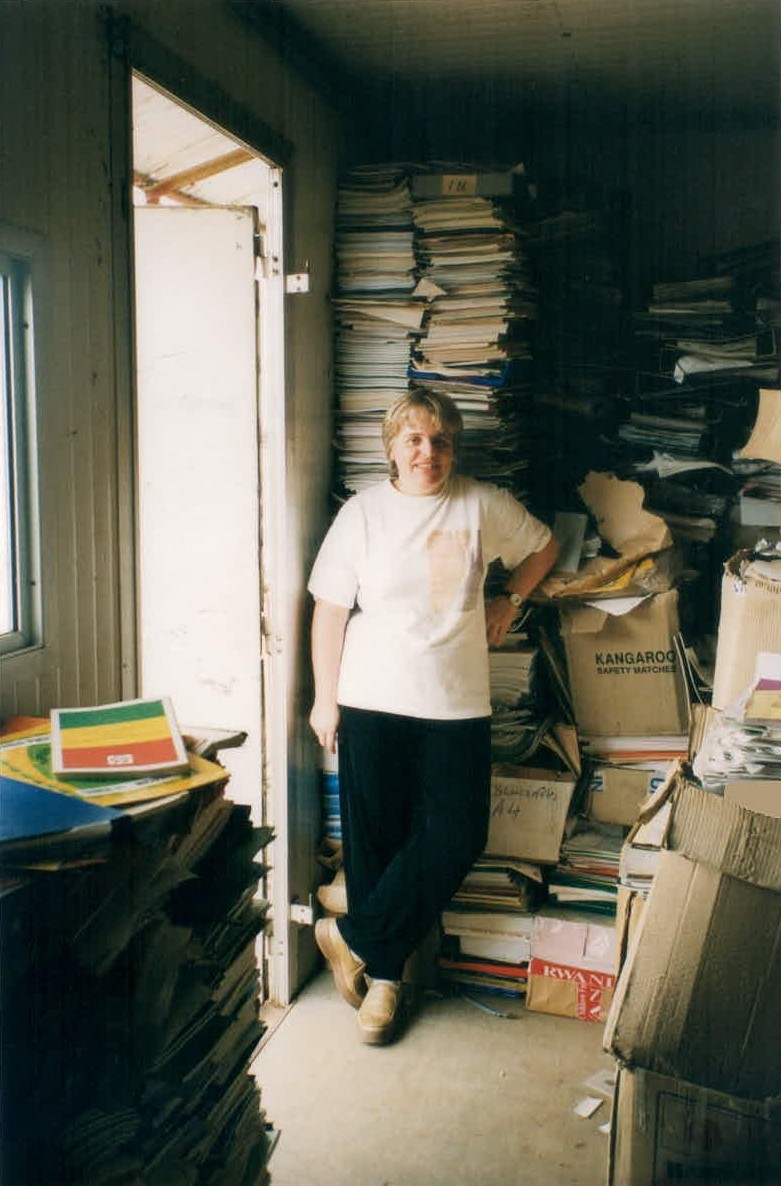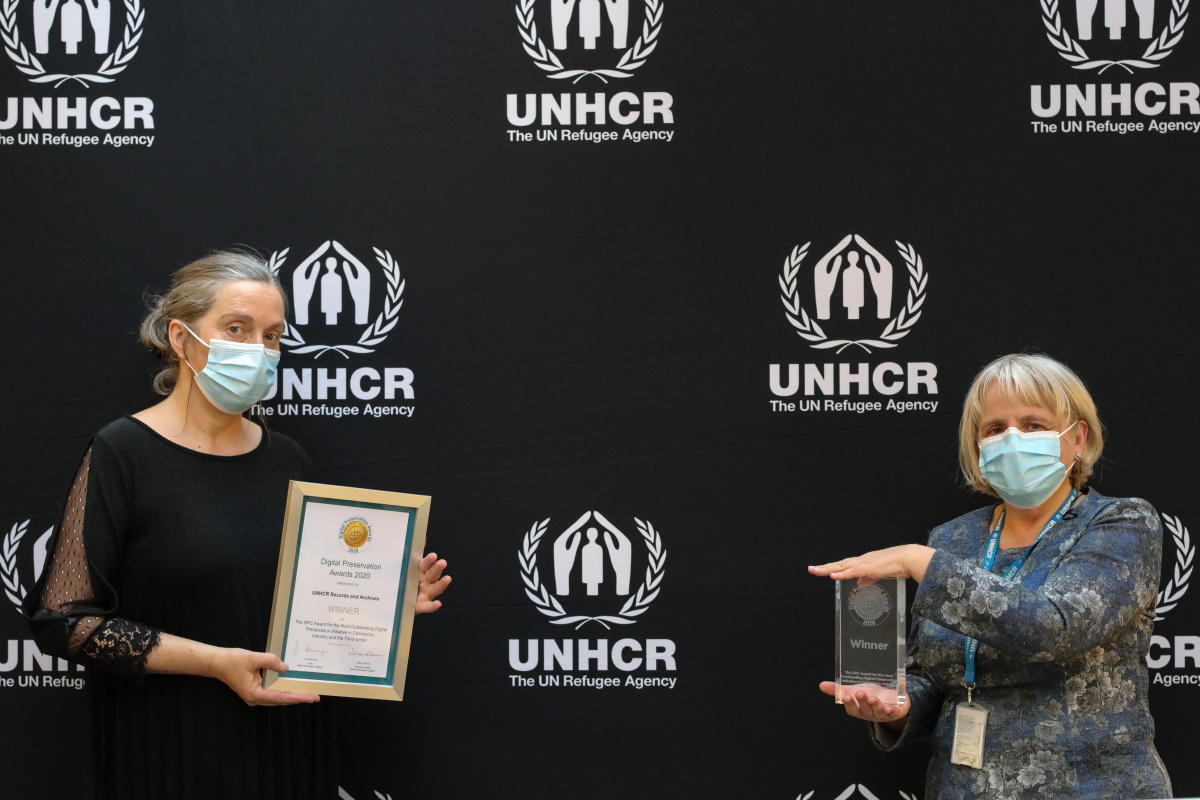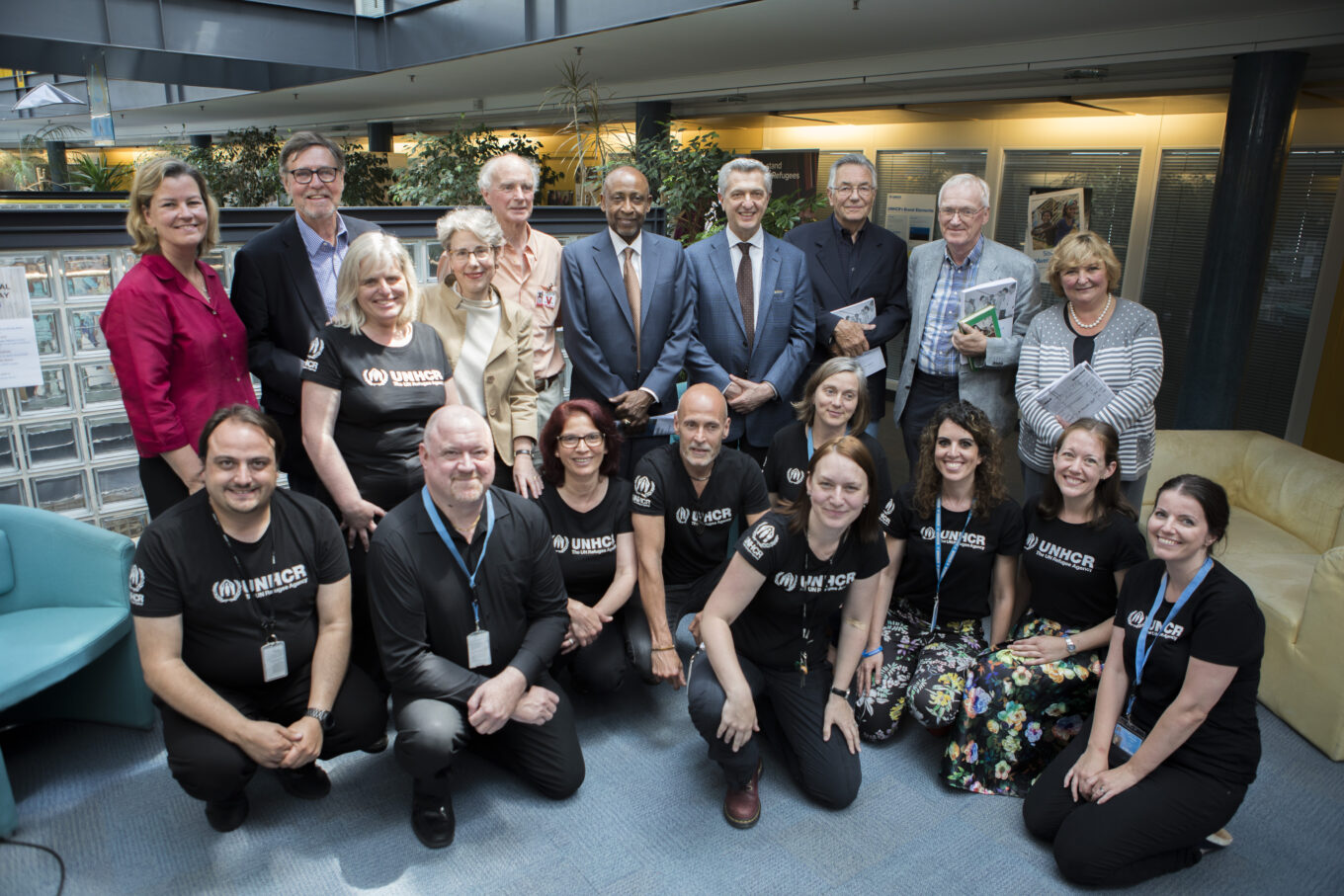By Motahareh Mohebi[1]
“She balances creativity and a positive “can-do” attitude so perfectly.”
“Always ambitious and never taking no for an answer.”
“Visionnaire, enthousiaste, intelligente, instruite, courageuse, persuasive, positive et tenace, elle a su entrainer dans son sillage les nombreuses personnes qui se sont succédées dans son équipe.”
“She has led us forward with her infamous “great ideas,” and we are a better section for it!”
“We learned to be brave under her leadership, to take risks, to make a noise.”
Working in humanitarian organizations like UNHCR always brings pressure for employees, whether in the field or at the office, and not many people are fortunate enough to work with an amazing professional like Chief of Section Maria Montserrat Canela Garayoa. This piece is an attempt to celebrate her brilliant work as an archivist, particularly in the humanitarian field and at UNHCR.
Montserrat was born and grew up in the village of Sant Guim de Freixenet, in the heart of Catalonia. She was inspired by an excellent history teacher in high school and chose to study history at the Universitat Autònoma de Barcelona (UAB). She fell in love with the Medieval deep, mysterious past and went on to earn her master’s in medieval history at the same university.
From that point, Montserrat’s journey into the world of archives began. Several of her professors were also archivists, and by working with them at the Crown of Aragon Archive, she discovered her passion for archival work. Her first role as an archivist was with the Cervera’s notarial archives, a collection with a reach medieval history. There, she secured a grant from Fundació Noguera to conduct an inventory, a monumental task that involved organizing 6,000 unlisted books from the XIV to the XIX centuries. In 1985, she passed theoretical and practical exams, earning the position of director at the Arxiu Comarcal Archive of Cervera. After five years, she sought a more dynamic setting and moved to Barcelona to work with modern archives.

(Left to right) Dolors Montagut, archivist, and Montserrat Canela Garayoa, director at Regional Archive of Cervera
She pursued a Master’s in Archives at the Universitat Autònoma de Barcelona (UAB) in collaboration with the Catalan Association of Archivists. During this time, interest in preserving archives grew. After 40 years of repression, cooperation between the government and the Catalan Municipalities led to the creation and preservation of regional archives, ensuring the protection of Catalonia’s heritage.
Starting with traditional archival work, Montserrat gradually transitioned into the realm of modern archives, focusing on records management. While this approach was already in use in the US and Canada, Montserrat proposed introducing it to the Catalan government. Colleagues were initially sceptical of this Anglo-Saxon methodology, she teamed up with a colleague skilled in computers, and they started from scratch. In 1991, the Department of Culture implemented this system for the first time in Spain.
Recognizing the crucial role of IT, she pursued an online bachelor’s degree in IT at Universitat Oberta de Catalunya (UOC), bridging the traditionally separate worlds of archives and technology.
After years of innovation, Montserrat felt a shift—an urge to move forward. Although she had a stable position as head of the archives and had just bought a new apartment in Barcelona, it was the time to change; like a chick in an egg, needing to break free. In 2000, she embraced that change and moved to Geneva to work with UNHCR.

Montserrat Canela Garayoa at Barcelona Department Culture Records Center
Surprises started to unfold during the interviews. The woman who interviewed Montserrat was Trudy Peterson, the head of the Archive Section at UNHCR, and Montserrat knew her from when Trudy presided over a CITRA[2] meeting, where Montserrat represented the Catalan Association Steering Committee. The hiring process for Montserrat was unusual; it took only two months from the day she applied until she was accepted. After 16 years of experience as an archivist, Montserrat began her work at UNHCR.
She has begun working with colleagues on records management, focusing especially on the digital aspect. After eight years, she has become the chief of the Records and Archives section at UNHCR.
She has been on many missions. Her first mission was not directly with UNHCR, but with the World Bank. The World Bank didn’t have an archive at the time and requested an archivist from the ICA (International Council on Archives) to go on a mission to Eritrea. They asked Montserrat if she could take on the task. One week later, the Ethiopian forces invaded Eritrea, prompting the UN to announce an evacuation, and she returned to Geneva in shock. Over the years, she has gone on numerous missions to Rwanda, Kenya, Cameroon, Tanzania, Sierra Leone, Kuala Lumpur, various countries in Europe, Chile, and the US. During her missions to Europe, she has focused on implementing digital systems and appraising paper records. Her work on these missions has involved assisting local colleagues, providing training, and setting up systems in various offices.

Montserrat Canela Garayoa on one of her missions to Africa
Montserrat’s leadership at UNHCR has been characterized by visionary thinking and bold action. She initiated the digital record capture programme for the Syria emergency, persuading the Deputy High Commissioner by drawing parallels with the Yugoslavia archives. Her innovative spirit has shone through the creation of UNHCR’s International Archives Day advocacy programme, which has elevated a little-known section in DER to organization-wide visibility. Montserrat co-founded the RAIOG group, fostering knowledge-sharing among international organizations in Geneva. Her strategic vision has led to establishing the first digital preservation service post in the UN, deliberately choosing an expert in digital preservation with archival background. Under her guidance, the RAS team at UNHCR has become renowned for professionalism, expertise, and warmth in a field often overlooked. Montserrat’s leadership has taught her team to be brave, take risks, and make their voices heard, transforming archival work at UNHCR. Her innovation and hard work with her colleagues have brought the UNHCR’s Records and Archives Section the Digital Preservation Award from the Digital Preservation Coalition in 2020.

(From the left) Patricia Sleeman and Montserrat Canela Garayoa, Digital preservation award, 2020, ©UNHCR/Laura Louise Bernier
She believes to be a good archivist, you need to know how to preserve, especially digital preservation, the advocacy and training skills to work in records management, and be able to apply these skills in your work. It’s also important to understand access policies and confidentiality. Furthermore, you need to be technically skilled and have the right mindset—to know what to keep, what to throw away, and to have a vision for the future. Archiving isn’t just about keeping but also destroying. There are no 100% standards, so you have to be creative, adaptive, and flexible. If you work in an organization, you need to understand and adapt to it. There will be times you feel lost, but you need to keep moving forward. On a deeper level, it’s about knowing how to sell your work—communicating what you have and how it can help others, which many archivists struggle with. It’s not enough to just do your job well; you need to show people how the archives can benefit them. And, as she has said, behind every page is a human—a person’s story, which makes it valuable. It’s not just about keeping papers for the sake of it. It’s about preserving people’s memories. Archives don’t just belong to researchers; they belong to the community that creates them. That’s why it’s important for archivists to return this knowledge to them since communities often can’t access it themselves without the proper techniques.
It’s also amazing to know that the current High Commissioner, Filippo Grandi, used to visit the archives as a researcher for writing a book before he was appointed as High Commissioner. Montserrat and he had a conversation about the difference between records at the head office and those in bureaus and operations. She remembers him as a kind, supportive person, and after becoming High Commissioner, he has always supported the section’s work.

International Archives Day event at Headquarters. From left to right: Deputy High Commissioner Kelly T. Clements; John Horekens; Director of the Division of External Relations, Rossella Pagliuchi-Lor; Nicholas Morris; MENA Director, Amin Awad; the High Commissioner Filippo Grandi; Gerald Walzer; Anne Willem Bijleveld; and the Director of the Europe Bureau, Pascale Moreau, Records and Archives team in black uniforms. ©UNHCR/Susan Hopper
Among the comments I have gathered from colleagues about Montserrat, one stood out: she is remarkably open with her team. She believes that the higher you go, the less you know about what’s happening below, due to filters. That’s why she values colleagues who are direct, honest, and don’t sugarcoat things. In the Records and Archives Section, she has had people she could trust to tell her everything, even if it wasn’t what she wanted to hear.
After 24 years at UNHCR, Montserrat will retire at the end of October 2024. Having published seven books, she plans to return to writing after retirement, this time focusing on medieval history. She will always hold a special place in the hearts of her colleagues who have learned so much from her.
[1] This text is based on an interview with Montserrat and colleagues’ comments about her.
[2] International Conference of the Round Table on Archives Add block
